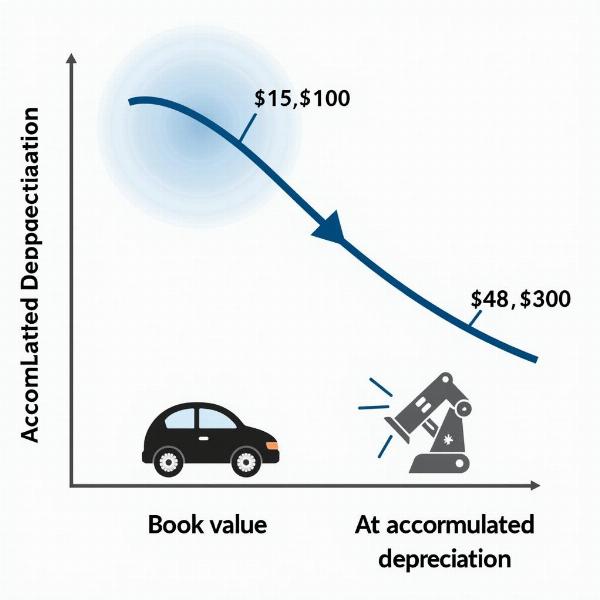Understanding accumulated depreciation is crucial for accurate financial reporting and informed business decisions. This guide provides a detailed explanation of accumulated depreciation, its meaning in Hindi, calculation methods, and its significance in business accounting. We will explore how this concept helps businesses track asset value over time and its implications for tax purposes.
What is Accumulated Depreciation?
Accumulated depreciation represents the total depreciation expense charged against an asset over its useful life. It’s a running total of the depreciation recognized up to a specific date. Think of it like a tally of how much an asset’s value has decreased since it was acquired. This is different from depreciation expense, which is the amount of depreciation recorded during a particular accounting period.
 Illustration of Accumulated Depreciation
Illustration of Accumulated Depreciation
Accumulated Depreciation Meaning in Hindi (संचित मूल्यह्रास)
In Hindi, accumulated depreciation is known as संचित मूल्यह्रास (Sanchit Mulyahras). संचित (Sanchit) means accumulated, and मूल्यह्रास (Mulyahras) means depreciation. Therefore, संचित मूल्यह्रास reflects the cumulative decrease in an asset’s value due to wear and tear, obsolescence, or other factors over time.
Calculating Accumulated Depreciation
Several methods are used to calculate accumulated depreciation, including the straight-line method, declining balance method, and the sum-of-the-years’ digits method. The chosen method depends on the nature of the asset and company policy.
Straight-Line Method
The straight-line method is the simplest approach, where the depreciation expense is the same each year. It is calculated by dividing the difference between the asset’s cost and its salvage value by its useful life.
Declining Balance Method
The declining balance method applies a fixed percentage to the book value of the asset each year, resulting in higher depreciation expense in the early years and lower expense in later years.
Why is Accumulated Depreciation Important?
Accumulated depreciation plays a vital role in financial reporting. It allows businesses to:
- Accurately represent the net book value of assets: By deducting accumulated depreciation from the original cost of the asset, businesses can determine its net book value, which reflects its current value on the balance sheet.
- Make informed decisions about asset replacement: Tracking accumulated depreciation helps businesses understand the remaining useful life of their assets and plan for replacements accordingly.
- Comply with accounting standards: Accurately reporting accumulated depreciation ensures compliance with generally accepted accounting principles (GAAP) and International Financial Reporting Standards (IFRS).
- Impact tax liabilities: Depreciation expense, and therefore accumulated depreciation, can impact a company’s taxable income.
What Happens When an Asset is Fully Depreciated?
When an asset is fully depreciated, its accumulated depreciation equals its original cost minus its salvage value. This doesn’t necessarily mean the asset is useless; it simply means its book value has reached zero. The asset can continue to be used, but no further depreciation expense is recorded.
Accumulated Depreciation vs. Impairment
While both relate to a decrease in asset value, accumulated depreciation is a systematic allocation of cost over time, whereas impairment represents a sudden and significant decline in value due to unforeseen circumstances.
Real-World Examples
Imagine a company purchases a delivery truck for ₹10,00,000 with a useful life of 5 years and a salvage value of ₹2,00,000. Using the straight-line method, the annual depreciation expense would be ₹1,60,000. After three years, the accumulated depreciation would be ₹4,80,000.
Conclusion
Understanding accumulated depreciation meaning in Hindi (संचित मूल्यह्रास) is essential for anyone involved in business accounting and finance. It provides a clear picture of an asset’s value over time and informs crucial business decisions. By accurately tracking and reporting accumulated depreciation, businesses can ensure compliance with accounting standards and make sound financial judgments.
FAQ
- What is the difference between depreciation expense and accumulated depreciation? Depreciation expense is the amount of depreciation recorded in a specific period, while accumulated depreciation is the total depreciation charged over the asset’s life.
- How is accumulated depreciation shown on the balance sheet? Accumulated depreciation is shown as a contra-asset account, reducing the gross value of the related asset.
- Can accumulated depreciation be reversed? Generally, accumulated depreciation is not reversed unless there is an error in the original calculation or the asset’s useful life is reassessed.
- What is the impact of accumulated depreciation on taxes? Depreciation expense reduces taxable income, which can lower a company’s tax liability.
- Why is it important to choose the right depreciation method? The chosen method affects the timing and amount of depreciation expense, which can impact financial reporting and tax planning.
- What happens if the salvage value changes? A change in salvage value requires recalculating depreciation expense for the remaining useful life of the asset.
- Is accumulated depreciation used for all types of assets? Accumulated depreciation is used for tangible assets that have a finite useful life, such as buildings, equipment, and vehicles.
Realisable value meaning in hindi
Accumulation in hindi meaning
Written down value meaning in hindi
Meaning-Hindi.in is your trusted partner for professional translation services between Hindi and various other languages. We specialize in Business & Commercial Document Translation, Certified & Legal Document Translation, Technical & User Manual Translation, Website & Localization Translation, Educational & Academic Document Translation, Express Translation, and Specialized Industry Translation. Whether you need accurate financial reports translated or require assistance with other business documents, our expert team delivers high-quality, culturally sensitive translations. Contact us today for all your translation needs at [email protected] or call us at +91 11-4502-7584. Meaning-Hindi.in is committed to providing accurate and reliable translation services for all your business needs.